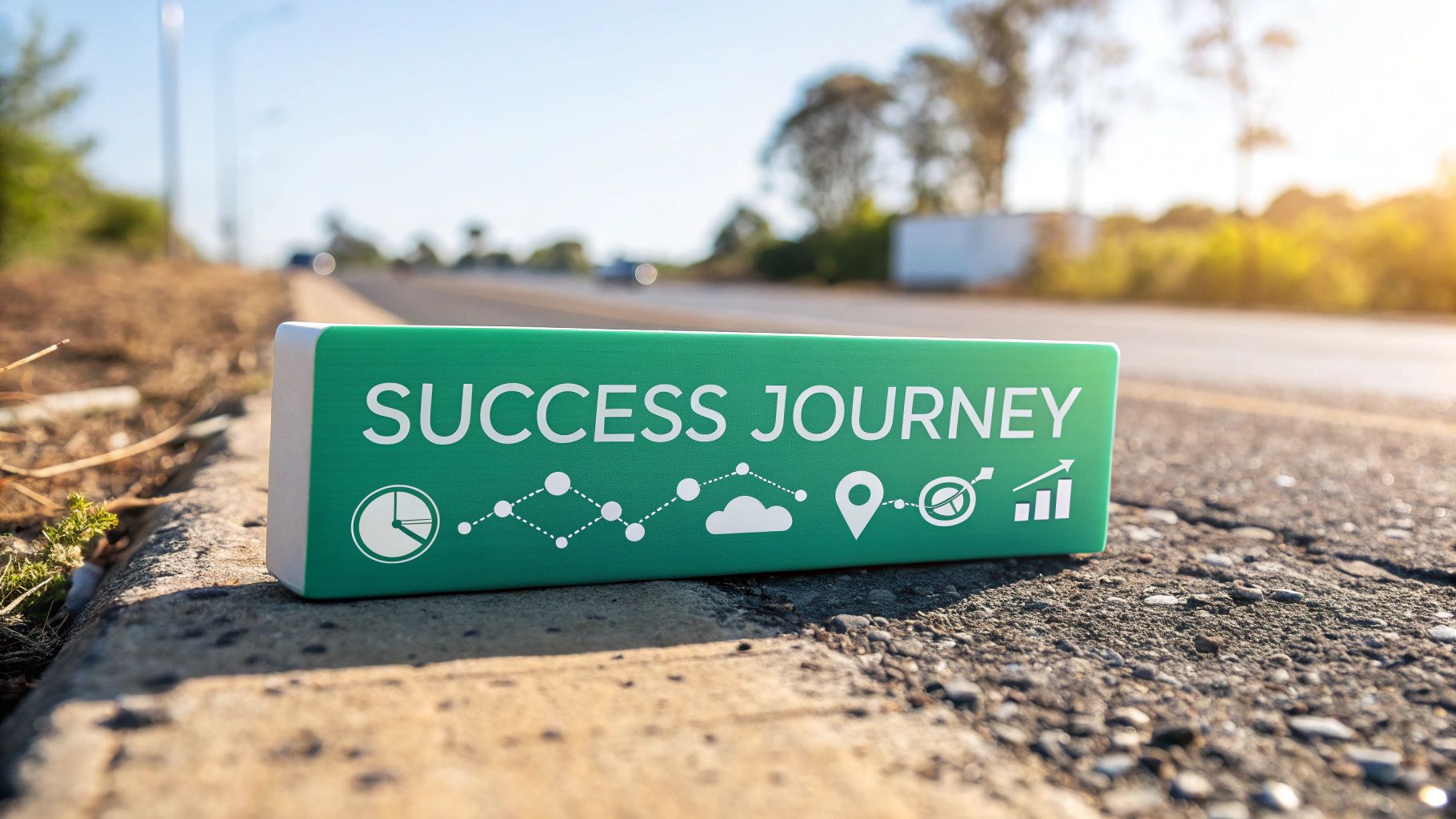Why Finding The Right Co-Founder Makes Or Breaks Startups

Choosing the right co-founder is a critical decision. It significantly impacts a startup's trajectory and potential for success. It's not just about finding someone with the right technical skills or business acumen. It's about forging a partnership built to withstand the challenges of entrepreneurship.
A well-matched co-founder can be the difference between securing crucial funding and struggling to stay afloat. Investors often favor founding teams, viewing them as more resilient and capable of navigating the complexities of a startup.
The Power Of Partnership: Complementary Skills And Shared Burden
One of the biggest advantages of having a co-founder is combining complementary skills. Think of it as assembling a puzzle: each piece, or skill set, contributes to the complete picture. This synergy allows startups to tackle diverse challenges, from product development to marketing and sales.
Having a supportive co-founder also helps alleviate the emotional burden of entrepreneurship. Sharing the highs and lows, brainstorming solutions, and offering mutual encouragement creates a more sustainable and rewarding journey.
Debunking The Solo Founder Myth
The image of the lone entrepreneur tirelessly building their vision is compelling. However, building a successful startup is rarely a solo act. While there are exceptions, such as Amazon, data suggests that co-founded startups tend to perform better financially and operationally.
The success of co-founder matching programs underlines this trend. Y Combinator, a renowned accelerator program, reports that only about 4% of their top 100 companies are solo-founded ventures. Learn more about the success of these programs here.
To illustrate the impact of co-founders, let's look at some comparative data:
Co-Founded vs. Solo-Founded Startups Performance
| Success Metric |
Co-Founded Startups |
Solo-Founded Startups |
Difference |
| Funding Success Rate |
70% |
40% |
30% |
| 5-Year Survival Rate |
60% |
35% |
25% |
| Average Revenue Growth |
15% year-over-year |
8% year-over-year |
7% |
This table showcases the generally higher performance of co-founded ventures across key metrics. This difference underscores the value a strong founding team brings to a startup's success.
The Investor Perspective: Why Teams Trump Individuals
Investors recognize the value of a strong founding team. A diverse team with complementary skills signals a greater likelihood of navigating the complexities of building a business. This is especially true for early-stage startups where adaptability is essential.
Investors look for teams with a clear market understanding, product vision, and execution ability. They also value resilience – a key factor in overcoming inevitable startup challenges. Finding the right co-founder is crucial not just for building a great product, but also for attracting the capital to fuel growth.
Inside Elite Accelerator Co-Founder Matching Programs
Elite accelerator programs like Y Combinator and Techstars recognize that a strong founding team is essential for startup success. These programs go beyond connecting founders with investors; they actively facilitate co-founder matching, using proven methods refined over years of experience.
Beyond Technical Skills: The Search for Complementary Traits
These programs understand that technical expertise isn't the only ingredient for a successful partnership. They also assess personality traits, work styles, and long-term goals. A technically gifted founder might need a partner with strong business development skills. However, differing communication styles or visions for the company could lead to friction. This focus on holistic matching sets these elite programs apart.
Measuring Founder Alignment: A Multi-Dimensional Approach
Accelerators use various frameworks to gauge founder alignment. They assess shared values, risk tolerance, and commitment levels. Personality tests and structured interviews help identify potential conflicts. This multifaceted approach aims to predict long-term compatibility, increasing the chances of a lasting partnership.
Y Combinator's Success Story
One of the earliest and most influential co-founder matching initiatives was launched by Y Combinator in the early 2010s. Their platform has seen significant success, with 28 companies formed through their service already funded by YC as of 2023. You can explore this topic further here.
Post-Matching Support: Preventing Partnership Failures
Matching founders is only the beginning. Elite accelerators provide ongoing support to help new partnerships navigate common challenges. This includes mentorship, workshops on conflict resolution, and access to legal and financial resources. This post-matching support is crucial for preventing early partnership breakdowns and fostering a healthy working relationship.
Alternatives to Co-Founders
When evaluating potential co-founders, consider alternatives like hiring a Fractional CTO. This can be a viable option for startups needing technical expertise without adding another co-founder.
Evolving Approaches: Learning From Experience
Accelerator programs continually refine their co-founder matching processes, adapting their methods to improve partnership compatibility. This ongoing improvement helps them remain leaders in co-founder matching, giving founders the best chance of finding the right partner. Some programs now prioritize shared values and long-term vision over simply matching skills.
Real-World Examples: The Impact of Effective Matching
The success stories emerging from these programs demonstrate the impact of effective co-founder matching. Founders often credit complementary skills and strong working relationships as key factors in their growth. These real-world examples highlight the benefits of a well-matched founding team. By understanding co-founder matching, aspiring entrepreneurs can improve their chances of finding the right partner and building a successful business.
The Definitive Guide To Co-Founder Matching Platforms

Finding the perfect co-founder can feel overwhelming. It's a crucial decision that significantly impacts your startup's trajectory. Thankfully, co-founder matching platforms simplify this process by connecting entrepreneurs with potential partners who share similar visions and offer complementary skills. This guide explores the key features and benefits of these platforms, helping you navigate the available options and select the best fit.
Understanding The Co-Founder Matching Landscape
The co-founder matching landscape offers a diverse range of options, from expansive networks to niche services. Some platforms cater to specific industries, like biotech or fintech, while others focus on particular stages of startup development, such as idea validation or scaling. Understanding these nuances is crucial for selecting a platform aligned with your specific needs.
For example, CoFoundersLab is a prominent platform connecting entrepreneurs worldwide. Its network spans over 200 cities and six continents, offering access to a vast pool of potential co-founders, advisors, and investors. The platform focuses on matching based on shared interests, skillsets, and location.
Key Features of Effective Platforms
Several key features differentiate effective co-founder matching platforms. These factors contribute significantly to a successful matching experience.
Robust Matching Algorithms: Effective algorithms consider factors beyond simple keyword matches. They analyze personality traits, work styles, and long-term goals to identify truly compatible partners.
Thorough Vetting Processes: Platforms that verify user profiles ensure you connect with serious, committed individuals. This saves you valuable time and mitigates the risk of partnering with unreliable individuals.
Post-Match Support: Ongoing support, such as mentorship programs or resources for conflict resolution, proves invaluable for navigating the challenges of a new partnership.
Targeted Search Filters: Filtering potential matches based on specific criteria, like industry experience, technical skills, or location, streamlines the search process.
Secure Communication Tools: Integrated messaging systems provide a safe and private environment for initial conversations and ongoing discussions. This fosters open communication from the outset.
Comparing Leading Platforms: A Data-Driven Approach
The following table compares leading co-founder matching platforms, highlighting key features and performance metrics to help inform your decision.
Leading Co-Founder Matching Platforms Comparison:
| Platform Name |
Geographic Reach |
Success Rate |
Vetting Process |
Cost |
Time to Match |
| Y Combinator |
Primarily US-focused, some international reach |
High, but selective |
Rigorous application and interview process |
Equity-based |
Varies, typically several months |
| On Deck |
Global |
Data not publicly available |
Application and curated selection |
Membership fees |
Relatively fast |
| CoFoundersLab |
Global |
Data not publicly available |
Profile verification and community reviews |
Freemium and paid options |
Varies depending on engagement |
| IndieMerger |
Global |
Data not publicly available |
Profile verification |
One-time payment |
Relatively fast due to AI matching |
This table provides a snapshot of each platform's unique characteristics. Consider your geographic preferences, budget, and desired matching speed when making your decision.
Choosing The Right Platform For Your Needs
Selecting the right platform is paramount for a successful co-founder search.
Your Industry: Niche platforms catering to your specific industry often yield better results.
Stage of Your Startup: Choose a platform aligning with your startup's current stage, whether it's ideation, early-stage, or growth.
Your Budget: Platform costs range from free basic access to premium subscriptions and equity-based models.
Your Time Commitment: Consider your available time and choose a platform that matches your preferred pace, whether it's rapid matching or in-depth relationship building.
By carefully evaluating these factors, you can significantly improve your chances of finding a compatible and successful co-founder partnership.
The Co-Founder Match Journey: From Search to Partnership
Finding the perfect co-founder is a critical step in any startup's journey. This section offers a practical roadmap, gleaned from the experiences of successful founding teams, to help you navigate the co-founder matching process. We'll explore each key stage, from initial self-assessment to establishing a trial partnership, providing guidance and highlighting essential indicators of success.
Understanding Your Needs: The Foundation of a Strong Partnership
The journey begins with introspection. Before searching for a co-founder, take time to honestly assess your own strengths, weaknesses, and long-term goals. This self-awareness will help you define the ideal partner – someone who complements your skills and contributes to a balanced and high-performing team.
Think beyond technical skills. Consider personality traits, work styles, and core values. Are you a detail-oriented planner or a big-picture thinker? Do you thrive in a structured environment or prefer a more flexible approach? Knowing your preferences will help you find a partner whose working style and vision align with your own.
Crafting Your Founder Profile: Attracting the Right Match
Once you understand your needs, it's time to create a compelling founder profile. This profile is your chance to showcase your skills, experience, and the type of partner you’re looking for. Be specific about your startup idea and the roles each founder will play.
This profile is your first impression. Clearly articulate your goals, values, and the kind of working relationship you envision. Transparency will attract partners who share your vision and set the stage for a productive and harmonious partnership.
Initial Conversations: Beyond Surface-Level Agreement
Early conversations with potential co-founders should be exploratory. Don’t just discuss skills and experience. Delve deeper into their motivations, long-term aspirations, and how they handle challenges. These discussions will reveal deeper compatibility and help you determine if your values and working styles align.
Key questions to consider during initial conversations:
- What are your long-term career goals?
- How do you approach conflict resolution?
- What are your expectations for work-life balance?
- What motivates you to pursue this venture?
These questions help uncover shared values and identify potential areas of disagreement.
Trial Projects: Testing the Waters Before Commitment
Before committing to a partnership, consider collaborating on a small trial project. This provides a practical way to assess your working dynamics, communication styles, and problem-solving approaches. A trial run reveals how you handle disagreements, manage deadlines, and make decisions together.
This practical test allows you to observe each other's work ethic and determine if your collaborative styles truly mesh. It's a low-stakes way to evaluate the partnership before making a long-term commitment.
Structuring Your Partnership: Equity and Decision-Making
If the trial period is successful, the next step is formalizing the partnership. This includes defining roles, responsibilities, and equity distribution. Establishing a framework for decision-making, conflict resolution, and communication is crucial for preventing future misunderstandings. Addressing these potentially sensitive issues early on will contribute to a more stable and successful partnership.
Timeline and Indicators: Knowing When to Proceed or Step Back
Throughout this process, be mindful of red flags that might indicate incompatibility. These could include persistent disagreements, differing work ethics, or a lack of shared vision. While some differences are manageable, significant misalignment in core values or long-term goals should prompt a careful re-evaluation of the partnership.
Setting a realistic timeline for each phase is important. Some partnerships form quickly, while others take more time. Be patient, but also recognize when it’s best to respectfully end discussions if the fit isn’t right. Finding the right co-founder requires time and energy. Choosing the wrong partner can have long-lasting negative consequences. This structured approach significantly increases your chances of finding a co-founder who complements your skills, shares your vision, and contributes to a lasting and successful partnership.
Advanced Co-Founder Search Strategies That Actually Work

Finding the perfect co-founder is a critical step in launching a successful startup. It's more than just browsing profiles; it requires a proactive and strategic approach. This section explores advanced techniques used by founders who've built thriving partnerships. These strategies go beyond the basics, helping you attract high-quality potential co-founders and build lasting, productive relationships.
Crafting a Compelling Founder Narrative
Your founder narrative is the story of your entrepreneurial journey. It's not just a resume; it's your vision, your passion, and the "why" behind your startup. A compelling narrative resonates with potential co-founders, drawing them into your vision and making them want to join your journey.
Instead of simply listing your technical skills, showcase how you've applied them to solve real-world problems. Highlight your entrepreneurial achievements and the valuable lessons learned. This approach transforms your profile from a dry recitation of facts into an engaging story.
Balancing Digital and In-Person Networking
Co-founder matching platforms like IndieMerger are valuable tools. However, don't underestimate the power of in-person connections. Industry events, startup meetups, and workshops offer organic networking opportunities.
Face-to-face interaction allows for a deeper connection. It helps you identify partners who truly align with your vision. Targeted networking within your industry exposes you to individuals with specific experience and expertise.
Optimizing Your Outreach for Meaningful Responses
When reaching out to potential co-founders, personalize your message. Avoid generic templates. Referencing something specific from their profile or work demonstrates genuine interest. This increases the likelihood of a positive response.
Mentioning a shared connection or expressing admiration for their previous work builds rapport. This thoughtful approach sets you apart and creates a more engaging initial interaction.
Maintaining Momentum During Extended Searches
Finding the right co-founder takes time. Stay persistent and maintain momentum. Regularly update your profile, attend networking events, and consistently engage with potential matches. This keeps your search active.
Don't settle for a less-than-ideal match out of impatience. The right partner is crucial for your startup’s success. Patience and a clear understanding of your needs will lead you to the best fit.
Practical Tools for Tracking and Planning
Use tools like spreadsheets or dedicated software like Airtable or Notion to organize your search. Track interactions, document partnership expectations, and develop contingency plans. This structured approach helps maintain focus.
Monitoring progress, identifying trends, and making informed decisions becomes easier. Documenting expectations and contingency plans helps establish clear communication. This minimizes potential conflicts down the road. These advanced strategies, combined with a thoughtful approach, greatly improve your chances of finding the ideal co-founder.
The On Deck Approach: Fast-Track Co-Founder Matching
On Deck has become known for its co-founder matching program, designed to quickly connect entrepreneurs with compatible partners. This approach prioritizes both speed and quality, allowing founders to efficiently build strong teams.
Curated Talent Pools: Ensuring Baseline Quality
On Deck’s success is partly due to its curated talent pools. The platform attracts ambitious entrepreneurs who have been vetted. This ensures a baseline level of quality and commitment among potential co-founders. This pre-selection process streamlines the matching process, allowing founders to connect with individuals who have a certain level of experience and drive.
Structured Evaluation: Identifying Compatibility Efficiently
On Deck uses structured evaluation frameworks to assess co-founder compatibility. These frameworks go beyond simply matching skills. They also delve into values, working styles, and long-term goals. This helps founders identify partners with complementary expertise and shared values. This structured approach offers a more efficient way to gauge the likelihood of long-term partnership success.
For instance, On Deck has made significant strides in co-founder matching, focusing on efficiency and success rates. They provide a curated talent pool where founders can find suitable partners within a short timeframe – typically less than two weeks. The platform reports a match rate of over 90%, suggesting a high degree of compatibility among matched partners. Learn more about co-founder matching platforms here.
Comprehensive Support: Beyond the Initial Match
On Deck’s support continues beyond the initial match. They offer resources and mentorship to help new founding teams navigate the early stages of their partnership. This ongoing support helps address common challenges and builds a strong foundation for a lasting relationship.
Balancing Speed and Thoroughness: A Key to Success
On Deck understands the need for both speed and thoroughness in co-founder matching. The platform facilitates quick connections while also emphasizing evaluation of long-term fit. This balance helps founders quickly form teams without sacrificing the careful consideration needed for a sustainable partnership. This approach differs from platforms that focus solely on speed or exhaustive evaluation.
Overcoming Cognitive Biases: Identifying Ideal Partners
The structured program at On Deck helps founders avoid cognitive biases that can hinder effective matching. Founders might be drawn to similar individuals, overlooking potentially stronger, more diverse partners. On Deck’s process encourages founders to consider a wider range of matches. This can lead to more diverse and ultimately more successful founding teams.
Case Studies: Real-World Examples of On Deck's Success
The success of On Deck’s co-founder matching program is reflected in the success stories of the teams they've helped create. Many On Deck-matched founders have built thriving companies, attributing their success partly to the strong partnerships formed through the platform. These case studies highlight the real-world impact of On Deck’s approach to co-founder matching.
Building a Resilient Co-Founder Relationship That Lasts

Finding the right co-founder is a significant first step. But the real work begins in building a partnership that can weather the storms of startup life. This requires a proactive approach to communication, conflict resolution, and adaptation.
Establishing Clear Communication Protocols
Open communication is the cornerstone of any successful co-founder relationship. Establishing clear protocols early on can prevent misunderstandings and build trust.
Regular check-ins are essential for discussing progress, challenges, and concerns. Also, agree on preferred communication methods. For instance, use email for formal updates, Slack for quick questions, and in-person meetings for sensitive discussions. This structured approach minimizes miscommunication and encourages proactive problem-solving.
Conflict Resolution: Strengthening Your Bond
Disagreements are inevitable. How you handle conflict, however, determines the strength of your partnership. Effective conflict resolution isn't about avoiding arguments; it’s about navigating them constructively.
Actively listen to each other’s perspectives, find common ground, and develop solutions that benefit both parties. When handled well, conflict can lead to growth and a deeper understanding of each other.
Adapting Your Partnership as Your Venture Grows
Startups are constantly evolving. Your co-founder relationship must adapt alongside the business. This might involve revisiting roles, adjusting equity, or refining communication strategies.
The ability to adapt and renegotiate is essential for maintaining a strong and productive working relationship. This flexibility allows your partnership to remain resilient in the face of change.
The Human Element: Emotional Intelligence and Psychological Safety
Building a lasting co-founder relationship goes beyond practical strategies. It requires attention to the human element. Emotional intelligence—understanding and managing emotions—is crucial.
Creating psychological safety is equally important. This means fostering an environment where both co-founders feel comfortable expressing themselves without fear of judgment. This encourages open feedback, essential for growth and adaptation.
Managing Stress Asymmetry: Supporting Each Other
Startup life often involves uneven stress distribution. One co-founder might face more pressure in a specific area. Recognizing and addressing this imbalance is crucial.
This could involve offering support, redistributing tasks, or seeking external guidance from a mentor. A supportive partnership acknowledges these fluctuations, ensuring neither co-founder feels overwhelmed.
Ready to find your ideal co-founder and build a thriving startup? IndieMerger connects verified founders with complementary skills, using AI-powered matching. Start your journey today.